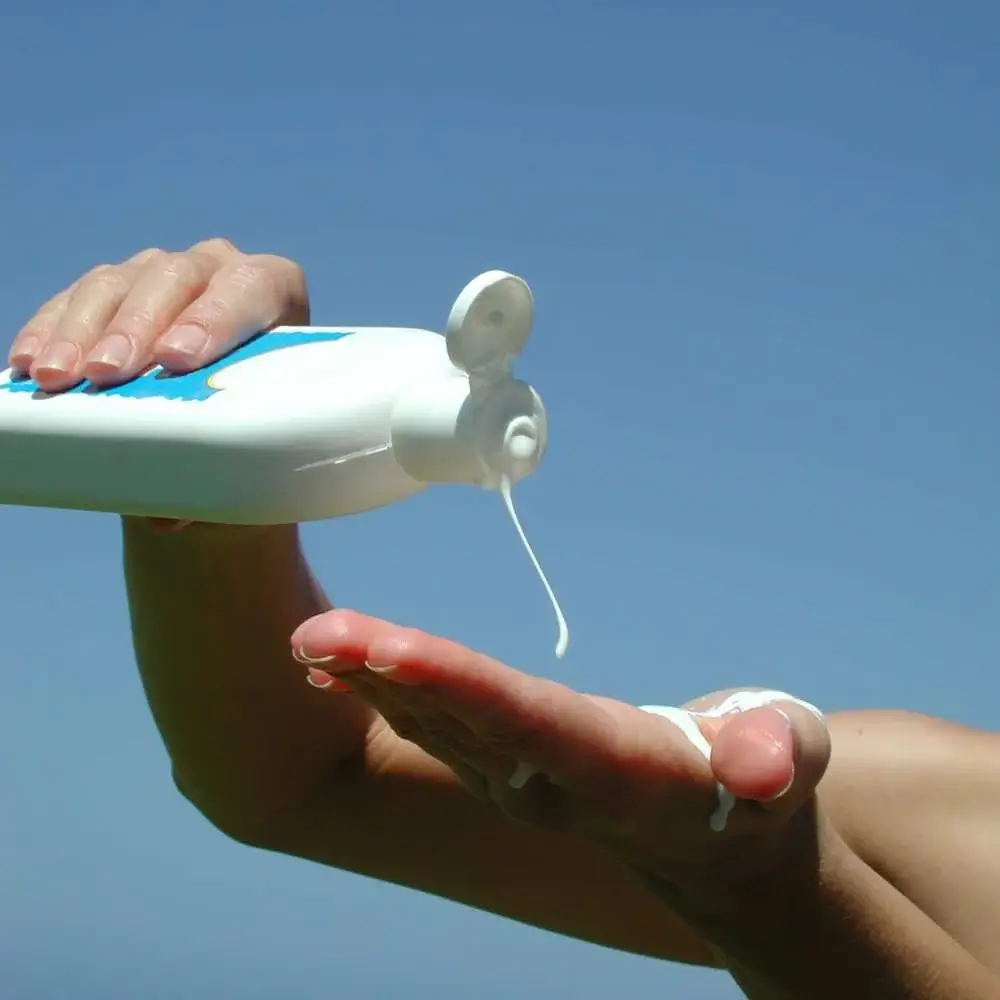Protecting your skin from the sun is as important as indulging in a scoop of ice cream on a scorching summer day. But for those of us with sensitive skin, finding the best sunscreen can be as tricky as trying to eat a popsicle without it dripping down your arm. Fear not, my fellow sun seekers! I've combed through expert advice and scoured the internet to bring you the ultimate guide to the best sunscreens for sensitive skin. Get ready to slather on some SPF and bid adieu to those pesky sunburns!

Protect Your Sensitive Skin with the Best Sunscreen: Our Top Picks
Taking care of sensitive skin under the sun can be a daunting task. But don't worry, we've got you covered! When it comes to shielding your skin from harmful UV rays, choosing the right sunscreen is crucial. With countless options out there, finding the perfect match for your skin type can feel like searching for a needle in a haystack. Fear not, because we've done the research for you. Read on to discover the best sunscreen for sensitive skin and bid farewell to sunburn and irritation.
Ingredients That Matter
When it comes to sunscreen for sensitive skin, the secret lies in the ingredients. Look for mineral-based sunscreens containing zinc oxide or titanium dioxide as their active ingredient. These gentle warriors physically block or reflect UV rays, minimizing the risk of irritation. Unlike chemical sunscreens, they sit atop your skin, providing a protective shield without causing any unpleasant reactions. Remember to steer clear of fragrances, preservatives, and dyes that could potentially irritate your skin while browsing for the perfect sunscreen.
SPF Matters: The Higher, The Better?
Ah, SPF (Sun Protection Factor) – the superhero of sunscreens! But does a higher SPF always mean better protection? Not necessarily. While a higher SPF number indicates increased defense against UVA and UVB rays, it's important to note that most people don't apply enough product for maximum benefit. Experts generally recommend using an SPF between 30 and 50, depending on your planned sun exposure. So, save yourself the headache and opt for the Goldilocks range to ensure just the right amount of protection for your delicate skin.
How Often Should You Apply?
Here's the scoop: sunscreen should be a daily habit, no matter the weather or your plans. Even if you're staying indoors, UVA/UVB rays can sneak their way through windows, putting your skin at risk. But what about those outdoor adventures? For extended periods under the scorching sun, such as swimming or sweating it out, experts advise reapplying sunscreen every 2 hours or immediately after taking a dip. This way, you can bask in the sunshine worry-free, knowing that your sensitive skin is shielded from harm.
Ready to Safeguard Your Skin in Style?
We understand that shopping for beauty products, especially sunscreens can feel like a never-ending maze. That's why our dedicated beauty team has done the hard work for you. We've scoured Amazon to find the very best sunscreens for sensitive skin – no more trial and error! Trust our beauty experts' verdict and bid farewell to skin irritation. Click here now to discover your new favorite sunscreen for sensitive skin and protect yourself against UVA/UVB rays with confidence. Your skin deserves the best!

Tips for Applying Sunscreen Effectively
Are you someone with sensitive skin who dreads the thought of applying sunscreen? Do you often find yourself dealing with skin irritation and redness after using sunscreen products? Well, fret not! In this article, we will explore the best sunscreen options specifically designed for sensitive skin. But before we dive into that, let's first discuss some essential tips for applying sunscreen effectively.
1. Choose the Right Formula
When it comes to sensitive skin, it's crucial to choose a sunscreen formula that is gentle and non-irritating. Look for sunscreens labeled as "hypoallergenic" or "sensitive skin-friendly." These formulas are typically free from harsh chemicals, fragrances, and dyes that can trigger reactions in sensitive skin.
2. Opt for a Physical Sunscreen
Physical sunscreens, also known as mineral sunscreens, work by sitting on top of the skin and reflecting the sun's rays. They contain active ingredients like zinc oxide or titanium dioxide, which provide broad-spectrum protection without penetrating the skin. Physical sunscreens are generally well-tolerated by sensitive skin and offer immediate protection upon application.
3. Check the SPF Rating
The Sun Protection Factor (SPF) indicates the level of protection a sunscreen provides against the sun's harmful UVB rays. For sensitive skin, it is advisable to choose a sunscreen with a higher SPF, ideally 30 or above. This provides an added layer of protection and reduces the risk of sunburn and skin damage.
4. Apply Enough Sunscreen
To ensure adequate protection, it's essential to apply enough sunscreen on all exposed areas of your body. The general rule of thumb is to use approximately one ounce (about a shot glass full) of sunscreen for your entire body. Don't forget commonly overlooked areas like your ears, neck, and the back of your hands.
5. Reapply Regularly
Sunscreen needs to be reapplied regularly, especially if you are spending an extended period outdoors or engaging in activities that cause sweating or water exposure. Reapply sunscreen every two hours, or more frequently if necessary. This helps maintain consistent protection throughout the day and reduces the risk of sunburn.
6. Combine Sunscreen with Other Protective Measures
While sunscreen is crucial, it should not be your sole defense against the sun's rays. Consider using other protective measures such as seeking shade during peak sun hours, wearing protective clothing like wide-brimmed hats and long-sleeved shirts, and using sunglasses to shield your eyes from harmful UV radiation.
By following these tips, you can effectively protect your sensitive skin from the damaging effects of the sun while enjoying your time outdoors. Remember, finding the best sunscreen for sensitive skin might require some trial and error, but with a little patience and diligence, you'll discover a formula that works wonders for your skin. Stay protected and embrace the sun without worries!

Importance of Protecting Sensitive Skin from Sun Damage
Sensitive skin requires extra care and attention, especially when it comes to protecting it from the damaging effects of the sun. Sun damage can cause a range of issues for sensitive skin, including redness, irritation, dryness, and even an increased risk of skin cancer. In this article, we will delve into the importance of choosing the best sunscreen for sensitive skin and how it can help shield your delicate skin from harmful UV rays.
Understanding Sun Sensitivity
Many individuals with sensitive skin have a heightened sensitivity to the sun's rays. This can lead to immediate reactions such as redness, burning, and itching upon exposure. Over time, repeated exposure to the sun can also contribute to long-term damage and premature aging of the skin. Therefore, it is crucial to take proactive measures to protect your sensitive skin and maintain its health and radiance.
The Role of Sunscreen in Protection
Sunscreen is an essential tool in the fight against sun damage. It acts as a barrier between your skin and the sun's harmful ultraviolet (UV) radiation. There are two main types of UV rays: UVA and UVB. UVA rays penetrate deep into the skin, causing premature aging, while UVB rays primarily affect the outer layers, leading to sunburns. Both types of rays can harm sensitive skin and trigger unwanted reactions.
By applying sunscreen with a high SPF (Sun Protection Factor), you create a shield that reflects or absorbs the UV rays before they can penetrate your skin. This helps prevent sunburn, reduces the risk of skin cancer, and minimizes the occurrence of other sun-related skin issues. It's important to note that sunscreen should be used alongside other protective measures, such as seeking shade, wearing protective clothing, and avoiding peak sun hours.
Choosing the Best Sunscreen for Sensitive Skin
When selecting a sunscreen for sensitive skin, it's essential to consider certain factors. Look for sunscreens labeled specifically for sensitive skin or those that are hypoallergenic. These types of sunscreens are formulated to be gentle and less likely to cause irritation or adverse reactions. Avoid sunscreens with fragrances, dyes, and harsh chemicals, as these can trigger sensitivity.
Opting for physical sunscreens, which contain mineral ingredients like zinc oxide or titanium dioxide, is also a wise choice for sensitive skin. These sunscreens work by creating a physical barrier on the skin's surface, reflecting UV rays away. They are generally better tolerated by sensitive skin compared to chemical sunscreens.
The Sunscreen Application Ritual
Applying sunscreen effectively is crucial for optimal protection. Start by cleansing your skin and ensuring it is dry before application. Take a sufficient amount of sunscreen and gently massage it onto your face and exposed areas of your body, making sure to cover every inch. Don't forget often overlooked areas like your ears, neck, and the back of your hands.
Remember to reapply sunscreen every two hours, especially if you are sweating or spending time in the water. This helps maintain continuous protection throughout the day. It's also important to check the expiration date of your sunscreen as expired products may not provide adequate protection.
Safeguarding sensitive skin from sun damage requires proactive measures and choosing the right sunscreen. By understanding the unique needs of your skin, selecting a suitable sunscreen, and applying it correctly, you can enjoy the sun while keeping your skin healthy and protected. Don't let sensitivity deter you from embracing the outdoors; instead, take charge and shield your skin from harmful UV rays. After all, a little extra care goes a long way in maintaining the well-being of your sensitive skin.

Additional Skincare Tips for Sensitive Skin
Taking care of sensitive skin requires a delicate balance of finding the right products and implementing a proper skincare routine. In addition to using the best sunscreen for sensitive skin, there are several other essential tips to keep in mind to maintain the health and vitality of your delicate complexion. Let's explore some additional skincare tips that can help you navigate the world of sensitive skin with confidence.
Patch Test New Products
When introducing new skincare products into your routine, it's crucial to perform a patch test first. Patch testing involves applying a small amount of the product to a small area of your skin, preferably on your inner arm or behind your ear, and observing for any adverse reactions. This step is especially important for individuals with sensitive skin, as it allows you to identify potential irritants before applying them to your face. If your skin exhibits any signs of redness, itching, or irritation, it's best to avoid using that particular product.
Use Gentle Cleansers
Cleansing is a fundamental step in any skincare routine, but it becomes even more critical for those with sensitive skin. Opt for gentle cleansers that are free from harsh ingredients like sulfates and fragrances. Look for cleansers specifically formulated for sensitive skin, as they are designed to be mild and non-irritating. It's also advisable to avoid excessive scrubbing or using rough washcloths, as these can further aggravate sensitive skin.
Moisturize Daily
Moisturizing is a vital step in maintaining the hydration and resilience of sensitive skin. When choosing a moisturizer, opt for fragrance-free and hypoallergenic formulas that are specifically labeled for sensitive skin. Look for moisturizers that contain ingredients such as hyaluronic acid, ceramides, and shea butter, as these can provide hydration without causing irritation. Applying moisturizer immediately after cleansing or showering helps lock in moisture and soothe sensitive skin.
Avoid Harsh Exfoliation
Exfoliating can help remove dead skin cells and promote a smoother complexion, but it's crucial to approach exfoliation with caution when you have sensitive skin. Harsh exfoliants, such as scrubs with coarse particles or chemical exfoliants with high concentrations of acids, can cause irritation and redness. Instead, opt for gentle exfoliation methods, such as using a soft washcloth or a mild enzymatic exfoliator. Limit exfoliation to once or twice a week to prevent overstimulating your sensitive skin.
Protect Your Skin from Environmental Triggers
Apart from sun protection, it's essential to shield your sensitive skin from other environmental triggers that can lead to irritation and inflammation. Extreme temperatures, wind, pollution, and harsh chemicals can all exacerbate sensitive skin issues. Consider wearing a wide-brimmed hat and using a scarf or face mask in extreme weather conditions. When handling household cleaning products or other chemicals, wear gloves to protect your hands from potential irritants. By being proactive in minimizing exposure to these triggers, you can help maintain the health of your sensitive skin.
Consult a Dermatologist
If you're struggling to manage your sensitive skin or experiencing persistent skin issues, it's advisable to consult a dermatologist. A dermatologist can evaluate your skin and provide personalized recommendations tailored to your specific needs. They can help identify any underlying skin conditions or allergies that may be contributing to your sensitivity and prescribe appropriate treatments. Remember, a dermatologist is a valuable resource in your journey towards achieving and maintaining healthy, radiant skin.
Caring for sensitive skin requires a gentle and mindful approach. By incorporating these additional skin care tips into your routine, alongside using the best sunscreen for sensitive skin, you can create a comprehensive regimen that promotes the well-being of your delicate complexion. Remember, everyone's skin is unique, so it's essential to listen to your skin's needs and make adjustments accordingly. With patience, consistency, and the right skincare practices, you can enjoy healthy, glowing skin that makes you feel confident and comfortable in your own skin.

FAQs about the Best Sunscreen for Sensitive Skin
How do I choose sunscreen for sensitive skin?
Choosing a sunscreen for sensitive skin can be a daunting task, but fear not! We've got you covered (literally). When selecting a sunscreen for sensitive skin, keep a few key factors in mind. Look for sunscreens that are labeled specifically for sensitive skin or those that are mineral-based with ingredients like zinc oxide and titanium dioxide. These ingredients are less likely to cause irritation. Opt for sunscreens that are free from fragrance, parabens, and other potential allergens. And of course, don't forget the importance of a high SPF rating for maximum protection. Some top recommendations for sensitive skin include EltaMD UV Clear Broad Spectrum Protection, La Roche-Posay, and Alba Botanica Sensitive Mineral Sunscreen. So go ahead, protect your sensitive skin, and have some fun in the sun!
How much and how often should you apply sunscreen?
When it comes to applying sunscreen, the saying "less is NOT more" definitely applies! To protect your precious skin from those sneaky sun rays, you'll want to slather on a generous amount. Aim for about a shot glass worth of sunscreen to cover your entire body. And don't forget those oft-neglected areas like your ears, neck, and the tops of your feet. As for how often to apply, here's the scoop: reapply every two hours, especially if you're frolicking in the sun or taking a dip in the water. Remember, even the best sunscreen needs a little refresher to stay effective.
How often should you apply sunscreen daily?
So, here's the scoop - to keep your skin sun-kissed and happy, you should apply sunscreen daily, my friend. Yep, that means making it a regular part of your skincare routine, rain or shine. Ideally, you want to slather on that SPF goodness about 15 to 30 minutes before sun exposure. And don't forget to reapply every two hours, even if you're just taking a leisurely stroll or chilling under an umbrella. Consistency is key! So go ahead, embrace the sunscreen-loving life and protect your beautiful skin like a pro!
Is SPF 30 or 50 daily better?
Ah, the eternal SPF debate: is it better to go for SPF 30 or 50 on the daily? Well, my sun-loving friend, here's the scoop: both offer great protection! SPF 30 blocks about 97% of the sun's harmful rays, while SPF 50 takes it up a notch, blocking around 98%. So, if you're spending a lot of time outdoors or have fair skin, SPF 50 might give you that extra peace of mind. But here's the thing - no matter which SPF you choose, the key is to apply it generously and reapply every two hours. Now, let's talk about the best sunscreen options for sensitive skin (because we've got your back, quite literally!). According to experts, some top contenders include EltaMD UV Clear Sunscreen with SPF 46, Blue Lizard Sensitive Face Mineral Sunscreen, and Isdin Eryfotona Actinica Mineral Sunscreen SPF 50+. So go ahead, slather on that SPF goodness and embrace the sunny days with confidence!
Is it OK to apply SPF everyday?
Absolutely, my sunscreen-savvy friend! It is not just OK but highly recommended to apply SPF every single day. Rain or shine, summer or winter, your skin needs that sweet, sweet protection from the sun's rays. Think of it as a daily love letter to your skin, showing it some major TLC. Whether you're stepping out for a quick errand or spending the day indoors near a window (yes, those UV rays can sneak in!), applying SPF should be a non-negotiable part of your skincare routine. And fear not, for I have the perfect sunscreen recommendations for sensitive skin. So slather on that SPF goodness and let your skin bask in the glory of sun protection every single day!
Read our article about best face mask for glowing skin here!
Read our article about best hypoallergenic eyeliner here!
Read our article about best shampoo for bleached hair here!







